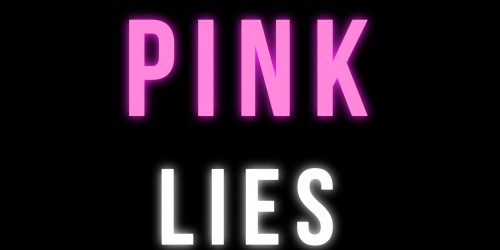
Losing Your Personal Integrity
 Written by Frosty Rose
Written by Frosty Rose
Recently, I attended a women’s conference for my job. Ya’ know, like, a real one that my company paid for and stuff. One of the speakers shared that one of the things that kept her on track with her leadership was her integrity. “The foundation, the absolute bedrock, of every decision that you make in business leadership must be your personal integrity.” It felt like she punched me in the gut. Once I got my breath back, I got to thinking—that is really, truly, the long-term consequence of a career in Mary Kay: the loss of personal integrity.
We talk a lot at Pink Truth about the financial hardships that a Mary Kay business causes, and it’s true, they’re substantial, climbing into thousands or even tens of thousands of dollars lost. It’s less common that we directly address the personal integrity cost that a consultant pays after some time with the company. But, in my opinion, financial costs are often easier to recover from. They’re more black-and-white. When a person loses her integrity, it takes a long time and a lot of guidance to recover it.
How does a consultant or director lose her personal integrity in Mary Kay? I mean, it’s a dang cosmetics company, right? You’re selling lipstick, not your soul! But how does this cosmetics company operate? On lies, manipulation, and creative accounting. Many consultants’ first lessons are “fake it till you make it” and how to always present your earnings as 50% of retail costs. They’re told to rely on other successful consultants’ and directors’ I-Stories when they’re recruiting if they don’t have any successes of their own.
They share social media pictures that purport to give true “before and after” results of products without verifying the reality of those pictures (they’re often photo-shopped). They pitch the “husband unawareness plan.” “Just put some on one credit card, some on a check and a little in cash, and he’ll never know how much you spent!”
In the early days of a consultant’s career, the lies are usually inconsequential. Tiny deceptions, or tongue-in-cheek half-lies (like the husband unawareness plan) designed to be mostly funny with a grain of half-truth. But the constant repetition of these lies recalibrates a person’s capacity for honesty—her integrity and personal moral compass.
My first several months in Mary Kay, I kept a close eye on my profit numbers. I knew how much I was making from my sales, but I had to keep those true numbers on the side. What I presented at weekly meetings was a much different picture. In reality, I was earning about 15-20% on my sales at parties, probably 35-40% on reorders. At meetings, the only acceptable answer was that you were earning 50% of your sales. It was just easier than opening your business books (if you even kept them) to the entire group every week. Or that’s how it was painted. But over time, the lines started to blur. I was still keeping up with my accounting, but in my mind, I began to get the idea that my profit was closer to that 50% mark. That’s what I repeated every week without fail, so it was nearly impossible to keep in my mind that those were not the real numbers.
I put a full store of inventory on my credit card as a brand-new consultant. They told me this would be a $3,600 wholesale order (true), which would be valued at $7,200 retail (true). They told me I would easily double my investment with my shiny new store (not true). They didn’t fully disclose that my cost included sales tax on the retail value of the product and that it would be nearly impossible to recoup those costs. My director did not disclose that she was ordering several hundred dollars of products that would be discontinued in a couple of months, nor that she was loading me up on extra retail product that I could use as samples.
When I questioned this, I was told that it was much more economical to open a full-sized product than to continually purchase samples. Later, I realized she earned commissions on all those full-sized products, and none on the samples. All in, that order cost me nearly $5,000. It maxed out my credit card, which I was not expecting.
But it was worth it! I was starting a business, and this was such an economical business. Any other boutique retail establishment would cost $100,000 to get started, at least! $5,000 wasn’t all that much. I paid it off within three months. Of course, I paid it with my first paycheck from my first “big girl” job and I was living with my parents so I had no expenses. I did not pay it off with my income from sales. But we didn’t talk about how I paid it off, so it wasn’t really a lie. Right? The corrosive effect of the continual tiny lies was beginning to compound.
Let’s go back to “fake it till you make it.” This is one of those sayings that everyone simply accepts as good sense. But is it? No! New consultants are told to emulate those with whom they would trade places. If you want to be a national sales director, find one, then do everything she does. It’s simple! If you’re dressed like a national, driving the kind of car she drives, wearing the same jewelry and makeup as she wears, people will naturally treat you like they treat her. They’ll take you seriously because you look the part.
But this creates an impossible standard. New consultants usually come into Mary Kay because they need extra money. They don’t have the resources to drop thousands on new suits and jewelry. And why should they have to? Additionally, this mentality sets up a consultant to play a dangerous comparison game, right from the start. If you’re not as successful as that national, it’s because there’s something wrong with you—just fix it! And always have your eye open for someone who’s more successful than you so you can become more like her and increase your own success. I can’t think of anything less likely to increase a person’s confidence than comparing herself to every other successful and beautiful woman in the room.
So, where does this leave us? A consultant or director has finally seen that Mary Kay is an irredeemable money pit, not the golden opportunity she signed up for. She has finally gained the courage to break the shackles of debt and endless stressful month ends. She’s free! At least from the financial mistakes.
But she’s now untethered from her integrity. She’s lost her true north of honesty and ethical behavior that she had before all the little lies eroded into the Grand Canyon in her soul. And her self-confidence is shattered by years of looking around the room, finding the handful of people who are more successful than her, and working to make herself more like them.
People on this site who have never been in Mary Kay often ask why we stayed so long, why we didn’t quit earlier. It’s as simple and as complicated as self-confidence and personal integrity. We lost the bedrock of our decision-making ability—our integrity. And we lost the confidence to question our leaders’ personal integrity. And those are harder to regain than the money we lost.





 Visit the
Visit the
It’s like the frog in boiling water analogy. The first few times I heard certain things, I did feel a twinge deep down inside, but I would remind myself that these women were Christians and wouldn’t intentionally lead me astray. I blamed those feelings on being too new to understand. And eventually I guess I became numb to the little lies and half truths. They almost became funny…don’t tell your husband how much you spent *laugh laugh giggle giggle*
The biggest ick feelings I got only came after I was in DIQ and really focusing on finishing DIQ. You want to sign up but don’t get paid until next week? I’ll pay for it and you pay me back! You don’t have enough for a $600 order? I’ll take up orders for you (from my customers) and I’ll pay for the order so I can get my $50 bonus! (I can’t believe I worked so hard for a measly $50.) Or my favorite…who can you borrow money from since you can’t open a credit card/get a loan/don’t have the money for the $1800 or $3600 order that you really want?
And the weekly director training? We spent almost a month and a half on the enneagram. I know there’s some controversy there, but for me personally, I had chosen to stay away from it and here we go with training and learning our number because that’s how the top leaders had been building so fast. But I went against my personal beliefs and my personal values because maybe I wasn’t being open-minded enough. These were still Christian women and they wouldn’t intentionally lead us astray, right?
And while I don’t believe some of these things were intentional, I do believe that many women had become so accustomed to most of this that it no longer bothered them or caused them to stop and think. And last but not least, from a Christian perspective, Satan can and will give us what we desire if we are willing to pay the price. Anyone watched The Devil’s Advocate?
“People on this site who have never been in Mary Kay often ask why we stayed so long, why we didn’t quit earlier. It’s as simple and as complicated as self-confidence and personal integrity. We lost the bedrock of our decision-making ability—our integrity.”
MLMs have spent decades perfecting their messaging and tactics to get recruits to turn off their critical-thinking skills. There are well-established patterns for doing this…and in some circles this is referred to as “brainwashing”. It takes repetition paired with exploitation of an underlying, unmet need to get one’s emotions to overwhelm reason.
When folks call MLMs like Mary Kay “cults”, that term may indeed be too strong. But there is significant overlap in the tactics used by cults and by MLMs. Falling victim to these tactics does not mean someone is “stupid” or even desperate. Even the smartest and most self-assured among us can fall for a good con. But only the vulnerable/desperate seem to fall for them more than once.
MLMs are finely tuned to exploit the vulnerabilities of the recruit. A good recruiter will be able to quickly recognize those folks who are not likely to fall for their tactics, and move on. Amway uses the “coy” approach, pretending they don’t want recruits who are not “good enough” to participate. This quickly weeds out the ones most likely to see through the tactics, saving them time. Meanwhile, the same tactic exposes the ones with “something to prove”. Bingo. These are the folks they want most.
It is my hope, and likely that of many who contribute to this site, that once folks recognize the deception in MLM (either through revelation from the inside or research on the outside), they will be better able to quickly recognize these tactics and thus steer clear of MLMs and many other types of scams going forward.
I totally believe the recruiters know. They know who they can snow and manipulate, and take advantage of those who are looking for inclusion and praise. They quickly realize who they can’t manipulate, and those people are discarded for the most part and ignored. It’s really very sad. These recruiters and the upline don’t realize how hurt some of their victims are and how damaged they can become. Or they realize, and just don’t care. That’s probably more likely.
“But she’s now untethered from her integrity. She’s lost her true north of honesty and ethical behavior that she had before all the little lies eroded into the Grand Canyon in her soul.”
I love a good turn of phrase, and this essay is chock-full of them. I just quoted one of my favorites. Frosty Rose, you are an uncommon writer. You’ve made very good points in very nice prose. Excellent work.